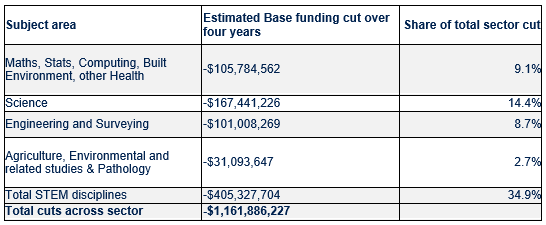New analysis by Universities Australia has confirmed the STEM disciplines will take the biggest hit of any field of study if the legislation passes, bearing 35% of the brunt of the $1.2 billion in cuts.
And while Government funding for each student place in a STEM course would be cut, STEM students would have to pay higher fees for those places – even though the Government’s own figures show that STEM degrees make a vast contribution to the public good.
"As Australia’s economy transitions into a new high-tech era, scientific skills and literacy are going to be foundational for many more future careers," said Universities Australia Chief Executive Belinda Robinson.
"In the next five years alone, there are expected to be an extra 126,000 scientific and technical jobs that will need higher qualifications."
"If we want Australia to be a STEM powerhouse, we can’t afford to cut public funding to train future scientists while also making science students pay more," Robinson said.
"This also runs counter to the Government’s own science and innovation agenda, which recognises the need for STEM skills more broadly across our economy."
A report to Government prior to this year’s Budget showed that STEM graduates delivered a high spillover benefit to Australian society, as well strong benefits for individual graduates.
For engineering graduates, the benefits of their degrees were analysed to have a 61% to 39% split of public and private benefit. For science graduates, 59% of the benefit of their degree was deemed to be public benefit – and 41% private benefit.
"The Government’s own analysis shows that these are precisely the kinds of graduates that we need in our economy and for our broader Australian society," Robinson said.
"If properly supported, their knowledge and skills will help to drive improvements in living standards and support technical innovation."
"Against a background of economic and technological change, increasing global competition, and a threat of widening disparity in opportunity – including between regional and metropolitan areas – university education is a way to bridge the gaps, shape our future and transform lives," she said.
The new analysis is released hot on the heels of National Science Week, which celebrates the important role of science in Australia and encourages science education across the community.
The estimated cuts across STEM disciplines over the next four years are as follows:



